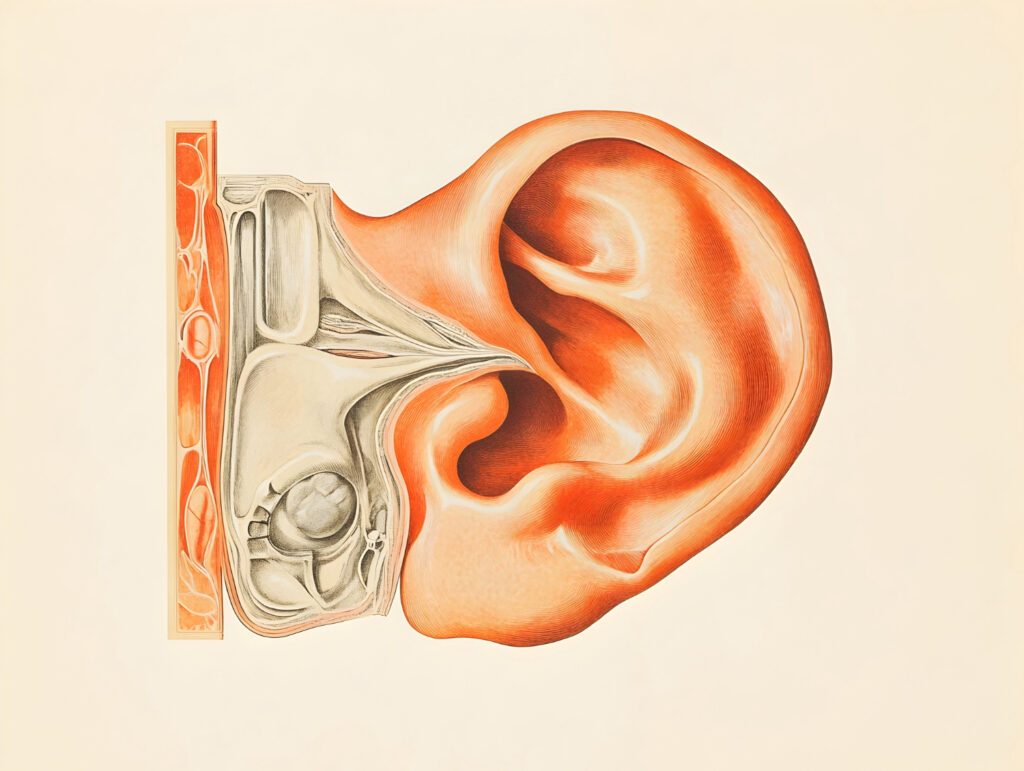That persistent ringing, buzzing, or whooshing sound that only you can hear? If you’re nodding along, you’re one of the estimated 50 million Americans who experience tinnitus. While many of us have learned to live with these phantom sounds, understanding what triggers or worsens them can be a game-changer for managing daily life.
Let’s dive into the most common tinnitus triggers that might be affecting your sound experience without you even realizing it.
1. The Volume Trap: Noise Exposure
We all love cranking up our favorite tunes or immersing ourselves in the roar of a live concert, but this common pleasure can be a major tinnitus trigger.
“I never thought twice about wearing earbuds at max volume during my daily runs,” says Martin, a 34-year-old software developer from Portland. “Three years later, I’m dealing with a constant high-pitched tone that’s especially noticeable after workouts.”
The Science Behind It: Prolonged exposure to sounds above 85 decibels can damage the delicate hair cells in your inner ear. For context, that’s about the volume of heavy city traffic or a blender. Once these cells are damaged, they can’t be repaired, and tinnitus may result.
Reality Check: Are you:
- Using earbuds at more than 60% volume?
- Working in loud environments without ear protection?
- Attending concerts or sporting events without hearing protection?
If you answered yes to any of these, you might be setting yourself up for tinnitus troubles.
2. The Caffeine Connection
That morning coffee ritual might be doing more than just waking you up—it could be turning up the volume on your tinnitus.
Caffeine acts as a stimulant that can increase blood pressure and constrict blood vessels, potentially intensifying tinnitus symptoms in some people. The relationship is highly individual—some report worse symptoms with caffeine, while others notice no difference.
Personal Experiment: Consider tracking your tinnitus intensity alongside your caffeine intake for two weeks. Then try cutting back gradually for another two weeks to see if you notice any changes.
Coffee isn’t the only culprit here—watch out for hidden caffeine in:
- Tea (including many green teas)
- Chocolate
- Energy drinks
- Some pain relievers
- Certain sodas and soft drinks
3. Stress: The Silent Amplifier
If you’ve ever noticed your tinnitus getting louder during especially stressful periods, you’re not imagining things. Stress and anxiety can significantly amplify tinnitus perception.
“During my divorce, the ringing in my ears became almost unbearable,” shares Rebecca, 42, from Chicago. “As I worked through the situation and found healthy coping mechanisms, the volume seemed to dial back down.”
The Connection: Stress triggers your body’s fight-or-flight response, releasing hormones like adrenaline and cortisol. These hormones can impact blood flow, muscle tension (especially in your jaw, neck, and shoulders), and your nervous system’s sensitivity—all potentially making tinnitus more noticeable.
4. The Salt Factor
That extra shake of salt might be doing more than just adding flavor to your food—it could be cranking up the volume on your tinnitus.
High sodium intake can raise blood pressure and cause fluid retention, both of which can affect inner ear function and potentially worsen tinnitus symptoms.
Sneaky Sources of Sodium:
- Canned soups and vegetables
- Processed meats
- Restaurant meals
- Packaged snacks
- Condiments like soy sauce and salad dressings
5. The Medicine Cabinet Surprise
Some over-the-counter medications have been linked to temporary or permanent tinnitus symptoms:
Common Culprits:
- Certain antibiotics
- Some non-steroidal anti-inflammatory drugs (NSAIDs)
- High doses of aspirin
- Certain diuretics
Pro Tip: Always review the potential side effects of any medication you’re taking, and keep a log of when you started new medications and any changes in your tinnitus. This information can be valuable to share with your healthcare provider.
6. The Sleep Connection
Poor sleep and tinnitus form a frustrating cycle—tinnitus can make it harder to sleep, and sleep deprivation can make tinnitus more noticeable.
“My tinnitus always seems louder when I’m exhausted,” explains Damon, 51, from Atlanta. “I’ve learned that prioritizing good sleep hygiene helps keep the volume manageable.”
Breaking the Cycle:
- Maintain a consistent sleep schedule
- Create a relaxing bedtime routine
- Make your bedroom a sanctuary (dark, cool, quiet)
- Consider masking sounds if tinnitus interferes with falling asleep
7. Screen Time and Digital Strain
In our increasingly digital world, many tinnitus experiencers report that extended screen time seems to exacerbate their symptoms.
While research is still exploring this connection, it may be related to:
- The stress of constant connectivity
- Eye strain that increases overall tension
- Poor posture during device use that creates neck/jaw tension
- Digital sound exposure through headphones
Digital Detox Strategy: Try implementing regular tech breaks throughout your day—even just 5-10 minutes hourly to look away from screens, stretch, and focus on deep breathing.
8. Weather and Barometric Pressure Changes
Feel like your tinnitus gets worse when a storm is brewing? You’re not alone. Many people report that changes in barometric pressure can affect their tinnitus intensity.
Similar to how these changes can trigger migraines or joint pain in some individuals, they may also influence inner ear pressure and fluid dynamics, potentially affecting tinnitus perception.
9. The Alcohol Effect
That glass of wine with dinner might be contributing to your evening tinnitus concert. Alcohol can impact blood flow, fluid balance, and potentially affect the auditory cortex in ways that might temporarily worsen tinnitus.
The Double Whammy: Alcohol can also disrupt sleep quality, creating a compound effect on tinnitus perception.
10. Jaw Tension and TMJ Issues
The temporomandibular joint (TMJ) is located close to the ear structures, and tension or dysfunction in this area can sometimes manifest as or worsen tinnitus.
Signs Your Jaw Might Be Involved:
- Tinnitus changes when you move your jaw
- Frequent jaw pain or clicking
- Regular headaches, especially in the morning
- Teeth grinding or clenching
Creating Your Personal Tinnitus Trigger Map
Everyone’s tinnitus experience is unique, and what triggers one person might not affect another. The key is becoming a detective in your own sound experience:
- Track Your Tinnitus: Use a journal or app to rate your tinnitus intensity daily (1-10 scale)
- Note Potential Triggers: Record diet, stress levels, activities, and environmental factors
- Look for Patterns: After a few weeks, review your notes for correlations
- Experiment Mindfully: Try eliminating suspected triggers one at a time to gauge impact
Living Well With Tinnitus
While identifying and managing triggers can help reduce tinnitus intensity, it’s equally important to develop a healthy relationship with the experience itself:
- Sound Enrichment: Using background sounds like nature recordings, white noise, or soft music can help make tinnitus less noticeable
- Mindfulness Practices: Meditation and mindfulness can help reduce the emotional response to tinnitus
- Stay Connected: Social isolation can make tinnitus more distressing, so maintain relationships and activities you enjoy
- Focus Outward: Engaging in absorbing activities can help direct attention away from tinnitus
Remember that you’re not alone in this experience—millions of others are navigating similar sound landscapes. By identifying your personal triggers and developing mindful approaches to living with tinnitus, you can reduce its impact on your daily life and wellbeing.

Disclaimer: This article is for informational purposes only and does not constitute medical advice. The information provided is not intended to diagnose, treat, cure, or prevent any health condition. Always consult with a qualified healthcare provider regarding any health concerns, especially before making changes to your diet, exercise routine, or medication regimen. Individual experiences with tinnitus vary greatly, and what works for one person may not work for another.
Sources: American Tinnitus Association, National Institute on Deafness and Other Communication Disorders, Harvard Health Publishing, Mayo Clinic



